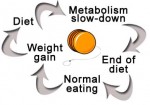 A recent UT Southwestern Medical Center study found that estrogen regulates energy expenditure, appetite and body weight, while insufficient estrogen receptors in specific parts of the brain may lead to obesity.
A recent UT Southwestern Medical Center study found that estrogen regulates energy expenditure, appetite and body weight, while insufficient estrogen receptors in specific parts of the brain may lead to obesity.
“Estrogen has a profound effect on metabolism,” said Dr. Deborah Clegg, associate professor of internal medicine and senior author of the study published Oct. 5 in Cell Metabolism. “We hadn’t previously thought of sex hormones as being critical regulators of food intake and body weight.”
The mouse study is the first to show that estrogen, acting through two hypothalamic neural centers in the brain, keeps female body weight in check by regulating hunger and energy expenditure. Female mice lacking estrogen receptor alpha – a molecule that sends estrogen signals to neurons – in those parts of the brain became obese and developed related diseases, such as diabetes and heart disease.
Similar results were not seen in male mice, although researchers suspect other unknown estrogen receptor sites in the brain play a similar role in regulating metabolism for males as well. Estrogen receptors are located throughout the body, but researchers found two specific populations of estrogen receptors that appear to regulate energy balance for female mice.
The findings are potentially important for millions of postmenopausal women, many of whom have decided against hormonal replacement therapy. The study could lead to new hormonal replacement therapies in which estrogen is delivered to specific parts of the brain that regulate body weight, thereby avoiding the risks associated with full-body estrogen delivery, such as breast cancer and stroke.
Doctors stopped routinely recommending long-term estrogen therapy for menopausal women in 2002 when a Women’s Health Initiative study showed the hormone did not prevent heart disease in women who already were at increased risk.
“The role of estrogen in postmenopausal women continues to remain uncertain,” Dr. Clegg said. “Current research is focused on the timing and the type of estrogen supplementation that would be most beneficial to women. Our findings further support a role for estrogens in regulating body weight and energy expenditure, suggesting a benefit of estrogen supplementation in postmenopausal women.”
Source: UT Southwestern Medical Center

 Staying up late every night and sleeping in is a habit that could put you at risk for gaining weight. People who go to bed late and sleep late eat more calories in the evening, more fast food, fewer fruits and vegetables and weigh more than people who go to sleep earlier and wake up earlier, according to a new Northwestern Medicine study.
Staying up late every night and sleeping in is a habit that could put you at risk for gaining weight. People who go to bed late and sleep late eat more calories in the evening, more fast food, fewer fruits and vegetables and weigh more than people who go to sleep earlier and wake up earlier, according to a new Northwestern Medicine study. Have you been losing weight and despite staying on your diet and exercising, your weight suddenly stays the same? Don't get discouraged, it's normal for weight loss to slow down and even stop. This phenomenon is called the "weight-loss plateau" and it's more common than you think. Even the best planned weight loss program can become stalled.
Have you been losing weight and despite staying on your diet and exercising, your weight suddenly stays the same? Don't get discouraged, it's normal for weight loss to slow down and even stop. This phenomenon is called the "weight-loss plateau" and it's more common than you think. Even the best planned weight loss program can become stalled.